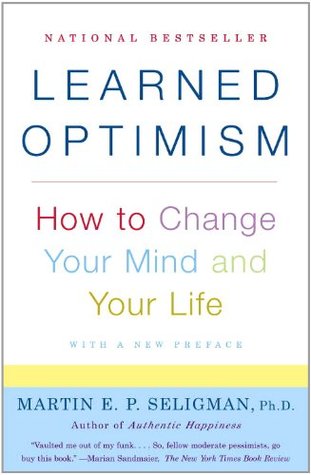More on this book
Community
Kindle Notes & Highlights
Read between
August 27 - October 30, 2016
People who believe good events have permanent causes try even harder after they succeed.
0
3
2
3
3
0
3
3
1 Some
3
3
Some
2
2 Occasionally
0
0
0
2
2 Occasionally
3
“What do you mean you can’t live without love?” he would cry. “Utter nonsense. Love comes rarely in life, and if you waste your life mooning over its all too ordinary absence, you are bringing on your own depression. You are living under a tyranny of should’s. Stop ‘should-ing’ on yourself!”
Depression results from lifelong habits of conscious thought.
This means pessimism is fertile soil in which depression grows, particularly when the environment is hostile.
Rumination, particularly when one is under pressure to perform well, makes the situation even worse. Often it is better to put off thinking, in order to do your best.
She learned how to talk to herself when she failed and how not to talk to herself when things went well.
But what, then, is the role of pessimism? Perhaps it corrects for something we do only poorly when we are optimistic and not depressed—namely, appreciating reality accurately.
But maybe truth and happiness antagonize each other.
Think about a successful large business. It has a diverse set of personalities serving different roles.
Perhaps a successful life also needs a CEO who has flexible optimism at his command.
Regression equations are what you do when you don’t know what else to do.
I think “talent” is vastly overrated.
Explanatory style is the great modulator of learned helplessness.
Middle-aged people who have at least one person whom they can call in the middle of the night to tell their troubles to, go on to have better physical health than friendless people.
recognizing automatic thoughts;
the more pessimistic candidate should engender less hope in the voters. The permanent and pervasive statements that pessimists make about bad events signal hopelessness. The more the candidate ruminates, the more this hopelessness is conveyed. If voters want a president who makes them believe he will solve the country’s problems, they will choose the optimist.
To test whether the optimism of candidates actually affects the outcome of elections, we needed a standard setting in which the speeches of the two candidates are comparable with each other and with their predecessors’ speeches. There exists a perfect setting—the nomination-acceptance speech, in which the nominee outlines his ideas for the nation’s future.
The first thing we found when we compared the pessrum scores of the two candidates in each election from 1948 to 1984 was that the candidate with the lower score—the more optimistic candidate—won nine of the ten elections. We did better than the polls did, simply by looking at the content of speeches.
We missed one—the Nixon-Humphrey election in 1968.
Ask yourself, “Is there any less destructive way to look at this?”
In many ways extreme individualism tends to maximize pessimistic explanatory style, prompting people to explain commonplace failures with permanent, pervasive, and personal causes.
You now have a choice. If you learn optimism, you can choose to use its techniques whenever you need them—without becoming a slave to them.


